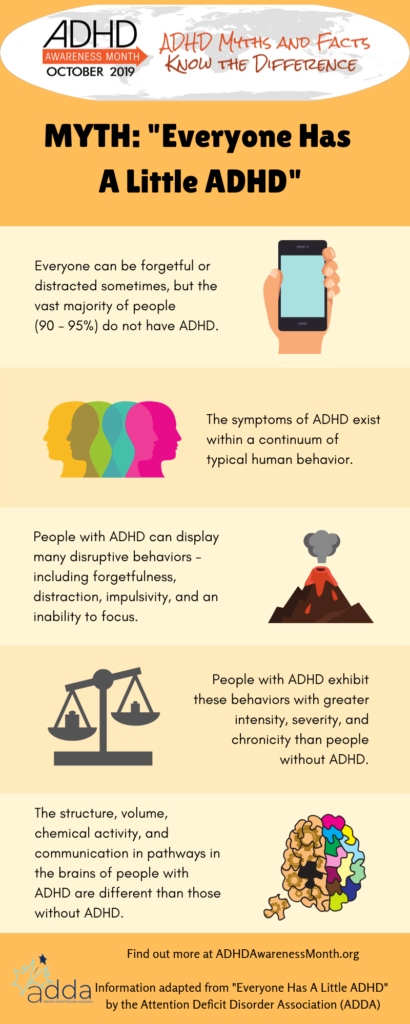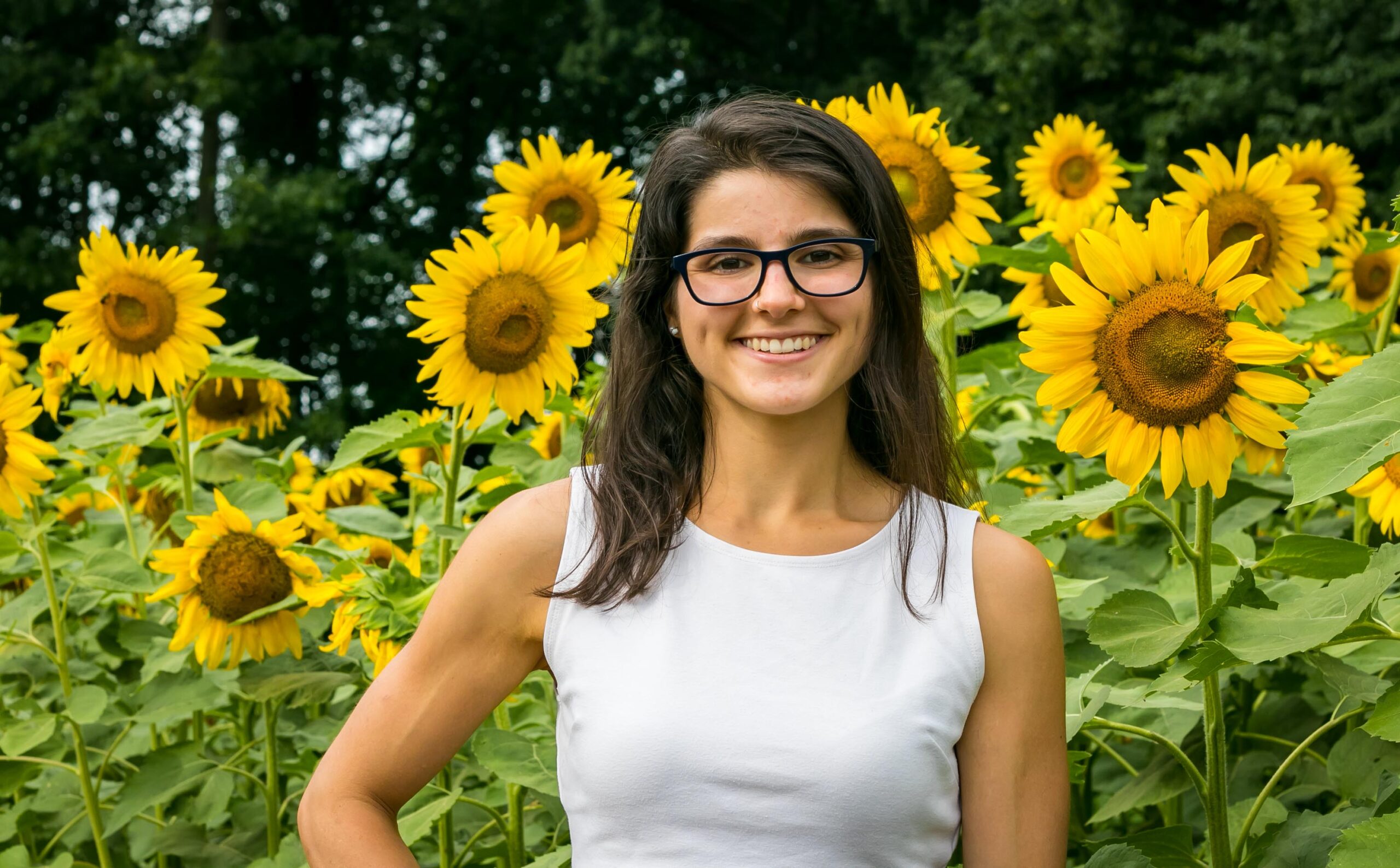24/7 Hotlines: Call or text 988 or text 741741
Post written by guest writer Stephani Esposito

When people think of ADHD they think of someone who is hyper, bouncing off the walls and just doesn’t stop talking. They think of the fact they take “stimulants” to be able to function or that they seem just lazy for not paying attention enough. Some of this is true, some of it is not. Attention deficit hyperactivity disorder is a medical condition that involves inherited chemistry imbalances and inabilities that affect the brain’s ability to perform executive functions. There are three types of ADHD; inattention, hyperactive/impulsive and combination.
Executive functions of the brain are things that help you pick a task, start it, continue through it, finish it, remember things, and self-regulate movements and emotions. That’s the scientific understanding of it. With the combination type ADHD my life was full of misunderstanding, ridicule, and shunning until there was more information and widespread understanding of the disorder where I finally experienced some acceptance.
Starting from elementary school where I was constantly in trouble for my lack of attention during class, my lack of ability to sit still, lack of ability to read social situations with peers and act appropriately. Many said to my mother “Something is wrong with your child.” I was even kicked out of catechism school by the Nun running the program due to my odd behaviors. I didn’t have many friends due to how poorly I read social situations and how I struggled to not interject during conversations. We didn’t know I had ADHD at this point because it was thought I was just a high energy child. But when it affected my school, home and even my ability to function as a child, my mother brought me to a psychologist where I was diagnosed and placed on my first medication at the age of 9/10.
Fast forward to middle school where I still struggled with many symptoms of the disorder despite being on one of the medications for it. I still couldn’t sit still or focus on classes that didn’t have me captivated no matter how hard I would try. I would have to ask questions multiple times and ask teachers to repeat things because my brain had zoned out during that one key bit of their lesson. This turned into teachers saying “you should have paid more attention” or “sorry you missed the information, ask one of your classmates.” I WAS paying attention as much as I possibly could, with all my physical being I was trying to focus. I couldn’t ask a classmate because they all thought I was weird and annoying for the way I acted. I felt so abandoned by many teachers and peers. I felt ashamed of who I was and how my own mind worked. I was 12 years old wishing I was someone else. Someone who knew how to shut up during a conversation and let the other person speak. Someone who could read the room and see that people didn’t find the comments or jokes funny. Someone who could stop fidgeting and picking at their skin. Someone who was normal, not someone with ADHD.
However, the one thing about ADHD is that we hyperfocus on things that we find interesting or find very important, to a point that it can become unhealthy. Through my trauma of being ridiculed by teachers for being below average marks I started becoming obsessive over school because I wanted to be accepted. I figured if I was smarter and did better in school I would be accepted. I was, by some luck, able to push my mind to find school very important, but that left me with a constant need to have straight A’s.
Most people with ADHD find school to be the hardest thing to focus on because tactile things are better able to keep our attention than auditory situations, such as school and learning. However I focused on school. This is just how my ADHD turned out to be for this period of my life. This was a favorable fixation throughout high school and college in the sense of my academics but I was completely emotionally tied to doing well in school. Less than perfect meant I was trash. I had created a perfectionist mindset within the brain of a person who would never be able to achieve perfection due to ADHD.
I was constantly studying, constantly trying to be better than my damn disorder. Going through planner after planner, white board after white board, just in an effort to get my brain organized week after week. (ADHD people know what I mean when I talk about this). It was endless until my friends got me out of my hyperfixation on grades with many deep conversations and knowing my fixation/inattention traits and when to call me out on them (as in I wouldn’t sleep or remember to do simple tasks people needed me to do because my ADHD was so hyper focused on grades). These few friends are people that changed my life.
With ADHD it is very hard to find and make friends. They have to be able to adapt to a whole new way of having conversations, having to constantly remind and reassure the person with ADHD that they are worthy of friendship and acceptance, help them through simple tasks and sometimes help them understand their own emotions. I have found a few friends who can “handle” me as they put it, which is a true way of explaining what being a friend to someone with ADHD may feel like.
I was always up front with people about my ADHD, explaining that I never meant to be rude if I zone out or interject. This would often lead to people who then kept their distance but there were a few who stuck around. These few people learned about ADHD and how I functioned, how my brain works. I, surprisingly, remember the day when my best friend first started being attentive and understanding when I would zone out, forget simple things, lose items etc. She would start by saying she knew I was zoned out and was wondering where I last remembered in the conversation and just start from there. No “why weren’t you listening to me?” No judgment about something I can’t control, just acceptance and meeting me where I am. Over the years she has understood that I need reminders of things we planned periodically before they were going to happen, check ins to see if I have eaten yet or if I am struggling to balance things now that I am an adult. To someone with ADHD, thoughts and actions like this mean so much to us because we know it takes effort to learn how to deal with it and to not be overwhelmed by it. Just writing this section about how I have friends that get me, made me cry because it was something I wanted so badly when I was younger, to where I am now and finally have that love and acceptance from others.

Even as a 24 year old adult, working as a nurse, I still struggle with my ADHD daily. Even with medications, it is a struggle to keep things moving forward and on track. Being an adult brings on more things that challenge the ADHD such as many more appointments and things that need to be remembered, chores that need to be done, tasks that can not take hours or that I can’t leave half completed and forgotten about. Every day is different.
Just know that if you have ADHD, I see you and I hear you and still love you even if you begin to trail off mid sentence into another topic because your mind has jumped and you have no control. I will listen to your story that takes you 10 minutes to tell because you have to bring in all the pieces of information of how you came to that idea through loose associations during your thought process. I will laugh at your ADHD memes that you send and I will be there when you feel like no one understands.
Just know if you don’t have ADHD and a friend or significant other does, ask them what they need to help keep them on track. Ask them how they best are re-oriented to conversations, ask them if they have the mental capability for the type of conversation you are trying to have. But also push them to achieve the things you know they can. Help them in the ways they need. I promise you, if you are willing to make an effort for someone with ADHD, they will be your friend for life and although they may forget to text back they will be the most enthusiastic person about anything going on in your life and be there for you more times than you can count.
With October being National ADHD Awareness Month, I hope I have shed a small amount of light on a personal perspective of how ADHD can be for some. I hope you are willing to read a bit on how ADHD actually affects people. Additionally, if you believe you may be suffering from ADHD, even as an undiagnosed adult, you can bring up some of the symptoms that are contained within the links to a doctor and ask for an evaluation. You are not lazy, stupid, incapable or any other condescending word. You’re unique and they are just jealous they can’t stim with you.
To learn more about ADHD, check out: What Is ADHD?


If you’re looking for more ADHD content, listen to our podcast Interview With Robyn About Life With ADHD.

© 2025 TurningPointCT.org. All Rights Reserved.
Thanks for sharing your story, Stephani. Great post!
Glad to hear that life is working out for you. Having a support system of understanding friends is so important.